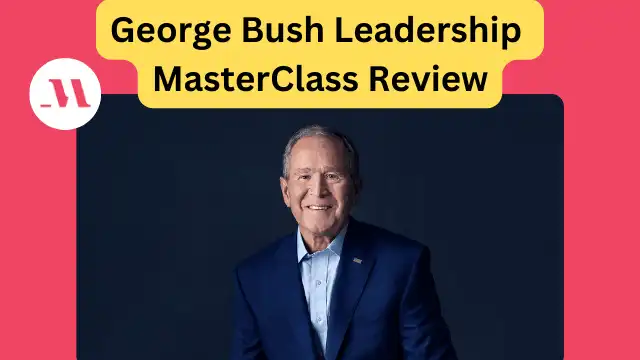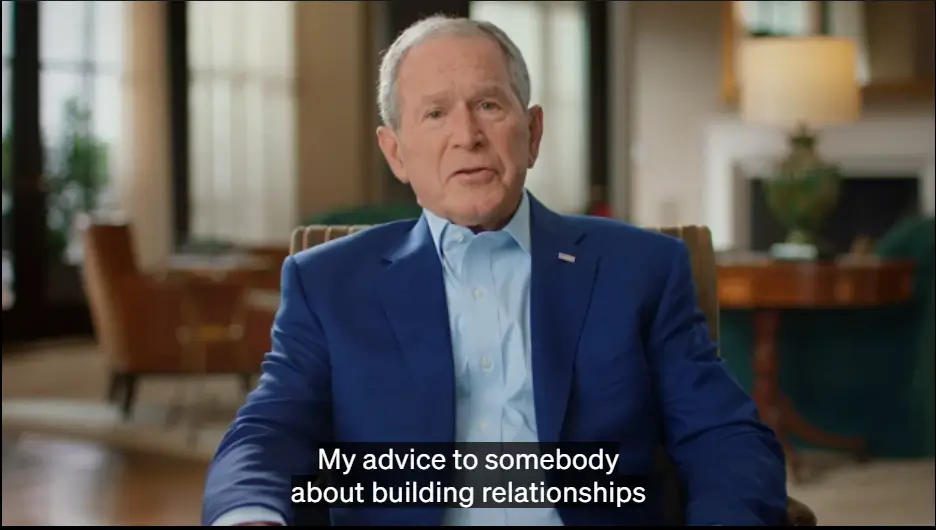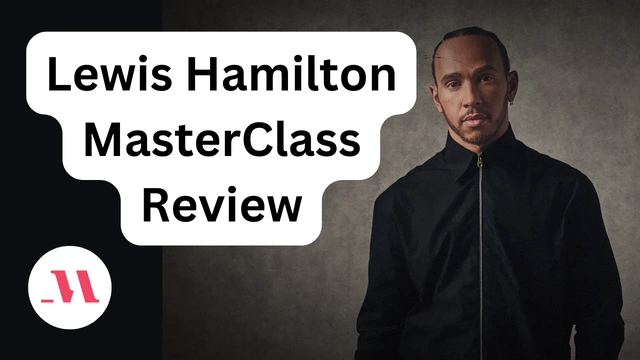Coursera Plus - Get Unlimited Access to 7,000+ Online Courses
Coursera Plus - Get Unlimited Access to 7,000+ Online Courses
Coursera Plus - Get Unlimited Access to 7,000+ Online Courses
I took George Bush’s MasterClass on Leadership (Review)
Disclaimer: This post is NOT sponsored. Some product links are affiliate links which means if you buy through those links, you won’t pay anything extra and we’ll also receive a small commission on a purchase.

Even before I finished watching the George Bush MasterClass trailer, my thoughts were the following: could I learn something from a former president who left the American public divided as to his efficiency? Will I get an objective perspective? I also wondered whether I would regret taking the class or leave with something valuable. Let’s see what answers I found.
If you’re curious about the platform as a whole, check out my comprehensive Masterclass review.
Who is George Bush and Why Should You Learn From Him?
George Bush, the 43rd President of the United States, is one of the most controversial leaders. However, his class is full of great pointers and valuable insights for aspiring leaders. Why should you learn from him though? Who else can teach you leadership better than a former president whose presidency was marked by events like the 9/11 attack, Hurricane Katrina, and the Iraq War? This masterclass is for anyone who wants to lead with unflinching resolve even during a crisis.
What’s Unique about the George W. Bush MasterClass?
Many celebrity instructors on MasterClass provide their take on leadership. However, what’s unique about Bush’s class is that he includes case studies on events that took place during his presidency. You will be able to evaluate the effectiveness of his teachings yourself. While most instructors would use the ‘What works for me may not work for you’ line, Bush touches on leadership principles that remain relevant no matter what field you are in.
A Deep Dive into George Bush Leadership MasterClass
Is leadership about popularity? Is it about power? Or is it about the people? Of course, it is about the people. Bush is humorous, sincere, level-headed, willing to listen, and unafraid to do what he thinks is right irrespective of public opinion – all the marks of a fantastic leader. Therefore, I wasn’t surprised to walk away with a clear perspective of leadership and its nuances. Read on to see what convinced me of this class’ worth.
Building and Enhancing Relationships
As a leader, you must learn to resolve issues without turning them into battles. The first step to do that is finding common ground with the person you are in conflict with. Bush explains the significance of doing that quickly and why you should be willing to get to know the people. He also teaches you how to put people at ease to facilitate easier and more effective communication.

However, what I loved about this lesson segment was his thoughts on understanding people’s perspectives. Whatever you do, do not skip the anecdote about his encounters with Putin and Hu Jintao. It’s starkly clear from the anecdotes that Bush is incredibly perceptive and skilled at gleaning insights from the smallest things people let slip.
Requisites for Achieving Your Vision
According to Bush, a clear vision, proper articulation of priorities, delegation, and accessibility are the keys to success. If you can’t state in clear terms what your vision is, how can you expect your team to help you achieve it? Bush explains the dangers of micromanagement, too.
Bush is big on being accessible. However, his take on it is a bit different. I liked it; so, don’t miss out on this lesson. You will also learn why alignment of authority and responsibility is a big deal. He explains this with the case study on Hurricane Katrina. The significance of holding people accountable is explained with PEPFAR and the No Child Left Behind Act.

Choosing the Right People for Your Team
Bush discusses picking and building your team using Incoming Transition – a case study. He also emphasizes you should value different opinions, but ultimately, the team must follow what you decide after listening to them. You will understand the right way to handle others’ mistakes and painful firing processes.
Decision Making
People look to their leaders to make the tough decisions. Bush explains why you need to develop a framework for decision-making and provides an example: The Bush Doctrine. If you have watched Boston Legal like me, you will know the doctrine was equally welcomed and criticized. When it led to American troops entering the Iraq War, mentioned in the Case Study: The Surge, the public was vocal about its divided opinions.
Does a leader worry about public opinion and image or do what he thinks is right with the available information? Bush firmly believes in doing the latter. Bear in mind that I am neither justifying Bush’s decisions nor opposing them. Objectively speaking, I think his decision-making techniques are sound. However, things don’t always go as planned, do they? That’s why he teaches you how to deal with false perceptions, too.
Dealing with The Unexpected
The very first line regarding this topic puts crisis management in a nutshell: you learn to deal with a crisis by going through a crisis. I will say this, Bush is incredibly succinct. He gets right to the point. That’s one of the reasons I loved this class. You learn how to act during a crisis, impart relevant information, and send the right message. Case Study: The 9/11 Attack helps us understand what went on in Bush’s mind.
We all know whatever rulebook we have is flown out the window during a crisis. Bush opines that relying on your instincts and best judgment is the only thing you can do at such times. The case studies on Hurricane Katrina and the Financial Crisis (which led to the birth of TARP) help us gain a perspective on crisis management.
Developing a Communication Style
You are the only one who can sound like you. Figure out your best version of communicating. However, Bush recommends using humor to communicate, in his class. He even refers to the infamous Bushism (I was rolling on the floor laughing when I researched this more). Be like him; don’t be afraid to poke fun at yourself.
Another thing I loved about this class was hearing Bush say public speaking becomes a comfortable experience only with experience. I was like ‘Yeah, that’s what I am talking about’. He also explains the symbiotic relationship between the press and a President.
A Closer Look at Politics
I know every aspiring politician’s ear will perk up in this section of the class. I heard people saying Bush’s masterclass is much more suited for politicians than leaders, and I disagree. The lesson Entering The Public Service is the only lesson that non-politicians can’t benefit from. Nevertheless, I recommend you watch that lesson, too, because some useful pointers are hidden among all those talks about politics.
Bush makes it clear that you have to work your way up from the bottom and put in a lot of effort to be a successful politician. You also learn more about campaign funding. He touches upon how his previous life experiences prepared him for his presidency. You also understand more about learning from failures and balancing personal and political life.
Prioritization – The Key to a Satisfying Life?
The gist of what Bush says about setting priorities is that if you don’t know what your priority is, you can’t organize the rest of your life to accommodate it. He speaks about his priority, how he quit drinking, and the importance of exercising and a clear mind. Most importantly, you learn how to maintain a disciplined life. He was an excellent President, husband, and father. You can trust his advice to lead a satisfying life.
Life is all about the Learning Experience
Most people get irritated when asked ‘How is life after retirement?’. I don’t think that will ever be the case with Bush. He missed the learning experience his presidency provided and found another source – painting. His cold wax painting is not half that bad. The pet portraits are much better. But, as he says the beauty of the art is in the eyes of the beholder.
He used his painting skills to reflect his belief that immigrants have positive effects on America (Out of Many, One series). Once a politician, always a politician, I guess. He proves that learning something new is always a joyous experience. Of course, there will be ups and downs, but it’s worth it in the end.
My Key Takeaways
- Don’t let professional disagreements influence personal relationships.
- You should be willing to listen to others, especially experts.
- A loyal team is monumentally significant for achieving your goals.
- Don’t chase after popularity. Do the right thing.
- Politics affects your family’s life, too.
- Be genuine, curious, humble, thoughtful, and empathetic.
- Never stop learning.
George Bush MasterClass Cost
All three MasterClass subscription plans provide access to the 200+ classes on the platform. You can’t get access to this class alone. Fortunately, the plans are relatively affordable and are offered at discount price sometimes. The Standard plan costs $120/year, the Plus Plan costs $180/year, and the Premium plan costs $240/year.

Besides, you get access to awesome classes like Bill Clinton’s Inclusive Leadership, Hillary Clinton’s Power of Resilience, Madeline Albright & Condoleezza Rice’s Diplomacy, and David Axelrod & Karl Rove’s Campaign Strategy And Messaging if you subscribe. So, the membership is worth it, don’t you think?
Final Verdict: Is George Bush MasterClass Worth It?
You must absolutely take this George Bush MasterClass regardless of who you are and what you do. As Bush said, not everyone can be a leader, but everyone can be a better human. This class helps you do that. Yes, it is primarily for leaders but the values you learn will help make your life better. That being said, stay away from this class if your political opinions about Bush’s presidency are too strong to let you learn anything from him.
FAQs
1. Is George Bush MasterClass Free?
No. You have to subscribe to one of the three MasterClass subscription plans to access the course and the class guide. The plans are billed annually. The Plus and the Premium plans allow offline access and let you use 2 and 6 devices simultaneously. The Standard plan has no offline mode and allows you to watch on one device only.
2. What is the duration of the MasterClass George W. Bush Teaches Authentic Leadership?
The Masterclass George Bush Teaches Authentic Relationship is 3 hours long. It is divided into 14 lessons, all of which are incredibly entertaining and informative.
3. What is the Bush Doctrine?
Explaining the Bush Doctrine in detail will take hours. But, to put it in a nutshell, the Doctrine is all about preemptive action (striking before enemies have a chance to attack), unilateralism, and regime change (partly forcible replacement of one regime with another).


